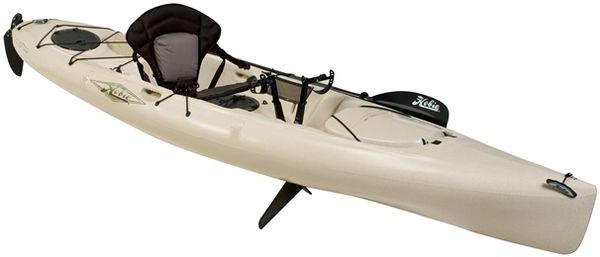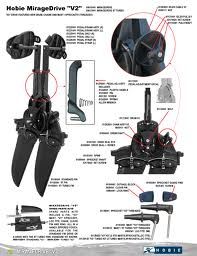I have been thinking about getting a kayak but the one thing I am not sure about is what the correct/ best length to buy, for a noob? I have found a dealer that has 8 foot and 10 foot for $200 / $250 with paddle.
I have no plans to use this in fast moving water or large open areas, mostly reservoirs and slow rivers.
Thanks Paul B
I'm not a kayaker myself, but REI has a decent article on choosing one based on how and where you will be using it: REI article.
I saw several today that were headed to the upper Hudson river.
They didn't look very long on top of the cars.
Just my guess.
8' and 10' is pretty stumpy for a flat water boat. Sea kayaks tend to be closer to double that length. My whitewater boat is 8'6". The kayak at my parent's cottage is 13', and it's a good lake boat.
(EDIT-Keith wrote his post while I was writing my identical post)
I'm a rower, but I see a bazillion kayaks on the flat Potomac every time I'm out. In short: Speed is a direct function of waterline length, and flat water boats skew long-ish. The tiny boats shaped like fat shovels are for white water. The ones that look like rowing shells and are incredibly narrow are race boats.
The rental boats are about 10' long, the people who own their own boats and who seem to go a lot faster are more like 13-15'. Race boats (check out Epic) are 16' and up.
For comparison my open-water rowing shell is 24' long and 20" wide.
As a noob many years ago, I bought a sit-on-top surf-ski that was just under 14', which I found to be very useful for rivers, lakes and waves in the ocean. If you get one of the shorter ones, I predict you'll quickly get a little frustrated with it - as motomoron indicated, speed is directly related to waterline length. I'd recommend trying a bunch of different ones at a good dealer, so you can really get a feel for what's most comfortable for you.
I've tried a few over the years. So far, the favorite I've tried is a kit sold by Chesapeake Light Craft (CLC) called the Pax 20. Narrow (about 20") long (almost 20') and incredibly easy to paddle fast. They describe it as best for experienced paddlers, but personally I didn't have a problem maneuvering it around. Initial stability was surprisingly good for such a narrow boat. Did I mention it's fast? About the only place I wouldn't want it would be in the extremely narrow and twisty rivers in southern NJ (I prefer a canoe there). But for the area reservoirs, that's what I'd want.
I have a Wilderness Systems Pungo, but it's about 15 years old and I don't think that the current Pungos are the same. I'm pretty sure that mine is 14 feet. It was my first and it is an excellent size for a beginner on flat water. If you go too short, you will be constantly adjusting your course (they're hard to keep pointing straight). If you go too long, it will be hard to turn.
I second the demo day comment. Find a dealer that is on the water and they will usually let you try a few out. A kayak is one of those pieces of sporting equipment that's kind of hard to choose in your head, but five minutes on the water and you'll know if it's right for you or not.
motomoron wrote: (EDIT-Keith wrote his post while I was writing my identical post) I'm a rower, but I see a bazillion kayaks on the flat Potomac every time I'm out. In short: Speed is a direct function of waterline length, and flat water boats skew long-ish. The tiny boats shaped like fat shovels are for white water. The ones that look like rowing shells and are incredibly narrow are race boats.
The term is "hull speed" and yes, the longer the waterline length, the faster the boat. This is why, Back in the days of IOR sailboat racing, that the boats had such long overhangs on the Bow and stern and they were made to heel over in the wind. They could get classified as a slower boat with a super short waterline length, but once they got some wind in the sails, would heel over and that length would magically lengthen.
My own boat is 22"6', but she has a waterline length of only 16 feet. She was built in the days of the IOR race rules.
Wiki gives the formula
I have a 9 1/2 ft riverboat that is just perfect for slow rivers. Plus, places to store sandwiches and beer.
Hobie Adventure Island Owner here.. 16ft.. Easily used/converted to trimaran/sailing Kayak...
I LOVE IT! The Hobie Kayaks with the Mirage Drive are AWESOME, and well worth the premium...
Buying the right Kayak though depends on how and where you want to use it.. I personally, unless white water Kayaking wouldn't consider less than 10 ft for flat water/slow rivers..

In reply to mad_machine:
Just remember that is for displacement hulls (which I know is what we are talking about here) so don't go thinking that the 30' Hydrosport will out run a 21' Allison. The equation doesn't work on any other type of hulls.
Have you considered outrigger canoes? Much more comfortable, faster and maneuverable than a kayak...in my opinion....though they will set you back. A bit more. Usually about twenty feet or so.
Flight Service wrote: In reply to mad_machine: Just remember that is for displacement hulls (which I know is what we are talking about here) so don't go thinking that the 30' Hydrosport will out run a 21' Allison. The equation doesn't work on any other type of hulls.
true.. but for a certain extent it does work between Kayaks. Eventually you run into the wetted surface/drag aspect because unlike a sailboat, you can't add bigger or more arms to a paddler
funny that this comes up. My wife and I have just started looking at getting a canoe for flat water and mild river rambling, along with maybe some tidal creek exploration. We've been looking at 16-17' tandems with enough capacity for us, the dog, and some gear or a third person. I really like the looks of the Mad River Explorer 16, but we'll probably pick up something off Craigslist as a starter.
I've been eyeballing the outrigger canoes with sail rig too...
Carry on.
I recently picked up a Hobie Revolution 13". Ron is right, the Mirage Drive system that Hobie has is incredible. Mine is plenty agile for smaller tidal-pools and rivers, but also long and stable enough that I've taken it offshore---- and surfed in on the waves. ![]() and yes....I flipped it---- no big deal getting it upright and climbing back aboard, even in deep water.
and yes....I flipped it---- no big deal getting it upright and climbing back aboard, even in deep water.
The Mirage-Drive Hobies will set you back some coin, but the speed they attain with the pedal system is incredible, and you can keep your hands free for fishing, picture taking, etc. The paddle still comes in handy for navigating in wind, but for straight-ahead speed the Mirage pedals rock!


I'm building a CLC Shearwater Sport. It's 14'-6" long. I'll let you know in a couple months if I think that is the correct length.
It's 14'-6" long. I'll let you know in a couple months if I think that is the correct length.
Current Design sea kayaks - 16-18' long. These things are wonderfully fast, but a pain to portage though the Canadian woods.

White water boats. Looks like the Dagger RPM, the Redline and a Riot 007 we called "the box". That thing was about 6' long.

mad_machine wrote:Flight Service wrote: In reply to mad_machine: Just remember that is for displacement hulls (which I know is what we are talking about here) so don't go thinking that the 30' Hydrosport will out run a 21' Allison. The equation doesn't work on any other type of hulls.true.. but for a certain extent it does work between Kayaks. Eventually you run into the wetted surface/drag aspect because unlike a sailboat, you can't add bigger or more arms to a paddler
Kayaks, canoes, push-boats, cruise ships, tankers and most sail boats are all displacement hulls.
Not necessarily. Two of the whitewater boats in that picture of mine have planing hulls. They're designed to surf.
You'll need to log in to post.